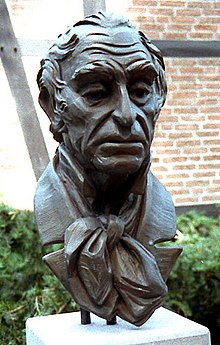Frederick Huth

Johann Friedrich Andreas Huth , anglicized John Frederick Andrew Huth , (born October 20, 1777 in Stade , Electorate of Hanover , † January 14, 1864 in London , United Kingdom ) was an important and influential British merchant , banker and cultural promoter of German descent at the time of the Industrialization . In 1809 he founded Frederick Huth & Co. in London, a leading bank in London at the time. In 1936 this became part of the British Overseas Bank , which in turn became part of the Royal Bank of Scotland in 1962 .
Life
Childhood and parental home
Johann Friedrich Andreas Huth was born in 1777 as the son of Marie Amalie, née Thee (1749-1812), and Johann Friedrich Gabriel Huth (1751-1800) in Stade , but grew up in Harsefeld . His father was a musketeer in the 12th Infantry Regiment of the Electorate of Braunschweig-Lüneburg and later worked as a tailor in Harsefeld. Huth's grandfather was a Guard Grenadier in Mecklenburg-Strelitz .
Career
From 1791 Huth was an apprentice at the Spanish merchant Brentano Urbieta & Co. in Hamburg . He also attended the Hamburg Commercial Academy. In 1797 Huth moved to Spain and worked at the parent company of Brentano Urbierta & Co. in La Coruna , started his own business as an import and export merchant in 1805, lived for some time in South America and last settled in London in 1809. There he founded his company Frederick Huth & Co. , which was initially active in exports and imports, but soon developed into one of the leading commercial banks in London. His bank had numerous agencies in the most important trading centers in the world. Huth enjoyed a great reputation as a successful businessman in London and had numerous contacts with court circles and diplomats as well as a great influence on the economy at the time of industrialization. He was generally known as "Napoleon of the City" .
In June 1819, Huth became a British citizen and Anglicized his name.
In 1829, Huth was appointed financial advisor to London, banker to the Spanish queen and financial agent of the Spanish government. In 1850 he retired.
Death and burial
Huth died in London in 1864 and was buried in Kensal Green Cemetery.
Private life
Huth was Lutheran (but later joined the Church of England ) and married the Spanish Manuela Felipa Lorenza Mayfren in La Coruna in 1806 . The marriage had eleven children. His sons Charles Frederick Huth (1806–1895), Henry Huth (1815–1878) Louis Huth (1821–1895) were also bankers.
Cultural promotion

In 1845 Huth first made contact with Harsefeld . He donated 1750 gold thalers for a public library as well as capital for a training school and for the support of the poor and for the development of the savings bank. He also donated the new church tower in Harsefeld and 300 thalers for the construction of the new church in Ahlerstedt .
The library in Harsefeld was opened in 1845 and is today one of the best equipped in the Stade district . Shortly before his death, Huth visited his hometown twice. Today the library bears the name Friedrich-Huth-Bücherei in his honor .
Honors
Named after Frederick Huth are:
- The Friedrich-Huth-Straße in Harsefeld
- The Friedrich-Huth-Bücherei Harsefeld
- The Friedrich Huth Room in the Harsefeld Museum
In front of the library there has been a larger than life bronze sculpture by Huth created by Carsten Eggers since 1998 .
Web links
Individual evidence
- ↑ a b c d Otto Heinrich May : Lower Saxony life pictures . Ed .: A. Lax. tape 7 , 1971, p. 91 ff .
- ↑ AIM25 collection description. Retrieved February 26, 2020 .
- ↑ a b c Summary of Individual | Legacies of British slave ownership. Retrieved February 26, 2020 .
| personal data | |
|---|---|
| SURNAME | Huth, Frederick |
| ALTERNATIVE NAMES | Huth, John Frederick Andrew (full name); Huth, Johann Friedrich Andreas (real name) |
| BRIEF DESCRIPTION | English businessman, banker and cultural promoter of German descent |
| DATE OF BIRTH | October 20, 1777 |
| PLACE OF BIRTH | Harsefeld , Electorate of Hanover |
| DATE OF DEATH | January 14, 1864 |
| Place of death | London , UK |